- Home
- Janice Kay Johnson
All the Lost Little Horses (A Desperation Creek Novel Book 2) Page 2
All the Lost Little Horses (A Desperation Creek Novel Book 2) Read online
Page 2
Cattle rustling. He shook his head in bemusement, and urged the gelding into a ground-eating lope.
One blessing: the rancher he’d been avoiding since the day he arrived in Hayes County didn’t run cattle, so he wouldn’t get called out there.
*****
Linette Broussard leaned against the warm, solid body of the stud who was making the reputation of her ranch. El Conde, more familiarly known as Rey, was one of the first Kiger Mustangs she’d adopted during an event held by the Bureau of Land Management, when they offered an opportunity to acquire one of the wild mustangs. The Kigers existed in the wild only in two herd management areas in southern Oregon, the same place they’d been discovered in the 1970s. The BLM still protected them and was careful to ensure they didn’t interbreed. Bringing El Conde as a far-from-tame yearling to this land she’d bought only months before had given her joy she’d almost forgotten was possible.
Rey remained skittish with strangers, quiet and well-mannered with Linette’s single employee, and loving with her. The promise she’d seen in him then had proved itself when he matured. A dark grulla, almost slate gray, he showed all the desirable qualities that defined the Kiger, descendants of horses brought to the Americas by the Spanish conquistadors. Compact and powerful, he had the classic dorsal stripe down his back, black bars marking his ears and shoulders and a black mask and legs. Faint “zebra” stripes showed on his legs. Just fifteen and a half hands, Rey had the long, lush mane and tail common with the Kiger mustangs. It took work to keep that tail, and a mane that hung nearly to his knees, free of tangles. Fortunately for her, he loved to be brushed and combed, usually half-closing his eyes like a contented cat as she worked on him.
Bright lights in the barn kept the night at bay. With the closest house a mile away, she heard only the whuffle of another of her Kigers blowing out, the faint thud of a hoof hitting wood, the soft hoot of an owl. Rey shook his head, and his mane settled over her like a thick, warm cloak. Laughing, she blew wiry hairs away from her nose.
“Yes, I love you, too,” she murmured, before giving him one last stroke and then backing away and letting herself out of the stall that led into a paddock currently open to pasture. Another horse called from a distance, and Rey ambled outside, his deep-gray coat giving him a ghost-like appearance for a few steps until he became lost in the darkness.
She didn’t let herself linger any longer. It had to be nine o’clock, and she hadn’t yet had dinner. She’d been self-indulgent to stay out here so long this evening. With her horses, she was never lonely. Once in the house, she became aware of how quiet it was, how few contacts she had with other human beings.
That was best for her, she reminded herself. Nothing good had ever come of relationships with men. They either abandoned you, or tried to turn you into a puppet with no remaining will to resist. Good reason to swear off men once and for all. She either had terrible taste, or an inability to make a partner happy. Horses were different. She had an eye for them, and a gift for connecting with them. They rarely let her down. Who needed a man?
She turned out lights, although a motion-activated one at the peak of the barn roof came on as soon as she stepped outside. She hadn’t thought to leave on any lights in the house, which meant finding her way through the darkness toward the darker bulk of the plain, two-story farmhouse. Like Rey, she imagined herself disappearing slowly as she left the too-bright circle cast by the floodlight.
Long ago, someone had planted several oaks that had survived the cold winters on this land that lay between the Ochoco Mountains and the barren high desert, where sagebrush thrived. She liked the shade daytimes, the broad, spreading oaks helping keep the house cool during the hot summers. But tonight, broad limbs blocked the moonlight.
Linette climbed the porch steps, her booted feet striking the boards much as Rey’s hooves had. Behind her, the floodlight went out. She was reaching for the doorknob when she heard a faint sound. Instinct had her going still, listening. Wildlife, she tried to convince herself. The owl wasn’t alone at being nocturnal. Rats, mice, snakes, coyotes. Perhaps something was hunting.
But the fine hairs on her neck prickled. Most night sounds were familiar. Whatever she’d heard…wasn’t. It made her think of a foot carelessly scuffed against the ground or a rock. Perhaps something brushing the corner of the house.
She couldn’t prevent herself from whirling to face the threat, but saw only the dark shapes of the oak trees, shadows. Then her heart jumped. What if the sound had come from inside the house? She hadn’t locked the door. She never did. Anyone could have walked in.
Linette stayed frozen for an absurd length of time. Gradually, one by one, her muscles relaxed. Yes, she’d read about the recent cattle rustling. That must be responsible for her anxiety. The crime log in the Courier mentioned domestic violence, vandalism, small-time theft, too, but really there wasn’t much crime around here compared to where she’d come from. It wasn’t as if she had anything worth stealing in the house, and nobody had seemed all that interested in her. Not even the man whose photo she’d seen in the Courier three months ago.
It stretched credulity to think he’d happened to move to Hayes County without knowing she was here. Nine months he’d been here. Nine months, and he hadn’t so much as called her.
No, not even the man she’d once loved with all her heart was interested in her.
She scanned the yard again, the long drive leading to the paved country road that fronted her property. Nothing.
With a shrug, she opened the door and went inside.
*****
In the next week, Jed found three other ranchers who’d lost cattle. The owner of the largest operation, Arrowhead Creek Ranch, sounded annoyed but philosophical in part because insurance would cover most of their loss. Jed would still be going out to talk to him.
The owner of the smallest of the three, Austin Jackson, was distraught. “I can’t afford this,” he kept saying, his eyes wild.
Looked like he didn’t have more than about thirty, forty acres. The house was small and shabby, but the barn had been rebuilt, the fences were in good repair, and he owned a nice looking quarter horse cross. He’d had a small herd of black Angus, and lost a dozen cows and calves.
“Do you have any idea how hard I’ve worked to get to this point?” Stocky, brown-haired and probably in his thirties, Jackson looked around.
Jed had a feeling he was seeing the magnificent spread of his imagination, not what was in front of him.
“My neighbors promised to sell me some land when I was ready,” he said softly. “I was going to expand. Someday quit my job.”
“Your job?”
“I work at the lumberyard.” He fixed his eyes on Jed in a way that made it hard to look away. “You’ve got to get my cattle back. Find these bastards. It almost has to be someone local. Most times, it turns out to be neighbors, you know. Damn, I’m tempted to go looking myself.”
“I’ll do my best, but I’m asking you to stick to your own land. You trespass, I might have to arrest you. I’d be sorry, but I’d do it.”
Jed didn’t know what else to say. From what he’d read, Jackson was right. Cattle rustling on a small scale was often suspected to be done by locals who could make some calves disappear and later believably express surprise if a cow that carried someone else’s brand appeared in their herd. Sometimes the cows reappeared a year or two later, having been used as breeding machines in the meantime.
Jed wouldn’t call this small-scale anymore, though. Nearly a hundred and fifty cows and as many calves were gone in his county so far. That added up to enough profit to justify a professional operation having swept in. By this time, the animals could be out of Oregon, hauled to Nevada, Idaho, Montana. If that were the case, tracing them would be a challenge, if not impossible, unless a stockyard somewhere called because they’d found a cow with the wrong brand mixed in with a herd. Even then, the individual selling the animals could deny having any idea where the cattle not his had come
from. He could blame the stockyard. And, from what Jed had read, the stolen animals could be sold to feedlots to avoid brand checks, or even straight to butchers. Rump roasts and hamburger didn’t carry brands.
Walt Whitney was right. Damn few cattle rustlers were ever arrested.
But the thefts had all been local so far; not a single neighboring sheriff’s department had heard from a rancher. In Jed’s book, that meant Walt Whitney was right: these men were preying on their own neighbors.
As his department SUV bumped over holes and ruts in Austin Jackson’s driveway, he set his jaw. The western way of life was already on the line here, ranchers teetering on the brink of failure. Now this.
He wasn’t capable of shrugging and saying, “I did my best.” Once he’d gone out to the two remaining spreads that had reported missing cattle, he’d contact every rancher he hadn’t yet spoken to, and urge them all to brand their calves now.
Next thing, he’d put in a call to the Malheur County Sheriff’s Department for advice. They’d gained cooperation from federal and state agencies, he knew, started patrols. No reason the same thing couldn’t be done here…before the rustlers struck yet another ranch.
Right now, he reluctantly made the turn toward Arrowhead Creek Ranch, which lay on the northern boundary of the county. They ran a good-size herd, in part because they bred and trained world-class cutting horses and needed cattle for the horses to work. The route out there would take him right past Linette Broussard’s place. The last time he’d been out this way, he’d still been trying to work himself up to knocking on her door. After all, she was the reason he’d come out to Oregon, taken this job.
But things had changed. He should quit the job and move away before they came face to face someday at the gas station or in the grocery store parking lot. But he felt an obligation to Grant Holcomb for hiring him, and he hadn’t run into her in the nine months he’d been on the job. From what he’d heard she was something of a recluse. Jed didn’t know if that was all his fault or not. These days, his regret was buried deep, though. Sometimes he thought he didn’t feel it at all anymore. Maybe today he wouldn’t have any trouble keeping his head from turning when he passed the burned wood sign that said, The LB Kiger Ranch.
CHAPTER TWO
Stance combative, Gene Baxter remained on his front porch, two steps above Jed and blocking his way upward. “What do you know about running a place like this anyhow?” he demanded, the sneer just subtle enough to allow Jed to ignore it.
He kept his posture relaxed, pretending he hadn’t noticed Baxter’s need for the high ground. A certain kind of man felt threatened by taller men. So far, Jed wasn’t impressed with this, one of many small-time ranches in these parts. Driving in, he’d seen that the fences could use work and the barn roof looked one winter storm from caving in. He was tempted now to say, I know you start by maintaining what you own, but he kept that thought, along with plenty of others, to himself. He wasn’t here to antagonize anybody. To the contrary, his goal was to build a spirit of cooperation, and ultimately a coalition of Hayes County ranchers, federal agencies and law enforcement officers.
“I grew up on a ranch,” he said mildly. Actually, he’d only spent four years in that particular foster home, from the age of twelve to sixteen, more or less, but that meant he’d been old enough to be put to work. He could ride a horse, cut a cow from a herd and rope the same way he didn’t have to think about how to ride a bike. As often as he’d been suspended from school back then, he’d about lived in the saddle. “I’m here to pass on a warning, not to criticize,” he continued. “Also to let you know we’ll be setting up some meetings to come up with ideas to choke these rustlers off before they do any more damage.”
Five foot nine or ten and stocky, Baxter spat tobacco juice to one side of the porch. Guess that explained the stained teeth. “I’m surprised you bothered to stop at a ranch the size of mine.”
“I’m more concerned about the smaller ranches than the big operations like Arrowhead Creek. They can afford a loss that might put a lot of ranchers under. You know Austin Jackson, don’t you? He lost a good part of his herd.”
“Huh.” His jaw moved, one cheek bulging. He appeared to have dialed back some of the hostility. “Well, happens I already heard from him and branded my calves.”
“Glad to hear that.” Jed touched the brim of his sheriff’s department dark gray Stetson and turned to return to his SUV. “We’ll be in touch about those meetings.”
Gene Baxter didn’t say a civil “thank you” or anything else. He crossed his arms and stayed where he was, still scowling when Jed reached the paved road and turned east.
Jed was able to let a lot slide off his back, but he found he was annoyed by the reception Baxter had given him. Strange he’d been here at all, come to think of it; from what Jed had heard, Baxter actually lived in town and undoubtedly held a job of some kind or other. He sure didn’t live off the sale of beef. Although his bottom line might be helped a whole lot if he was part of the recent raids.
Jed had been doing his best to take a look around each place he visited. All those cows and calves had to be held somewhere, if only temporarily. When he asked, most ranchers had willingly given him at least an abbreviated tour. He’d learned about a couple of breeds of cattle new to him, got a sense of who was running a serious business, even if it didn’t quite provide a living wage, and who kept a small herd for a hobby or because they felt bigger claiming to ranch than admitting they pumped gas at the Shell station in town.
Gene Baxter, Jed thought, hadn’t wanted him on his property, which about guaranteed he’d come back at a better time. The guy had a problem with authority, it seemed. He wasn’t alone in resenting the concept of paying for the right to graze his herd on federal land – although in his case it was ludicrous since without an allotment – which he didn’t have – he had no access to public land even if he was willing to pay for it. Either way, he had been rash enough to have joined Curt Steagall, the owner of the Circle S ranch, in starting up a small militia group meant to imitate the equally hotheaded ranchers who’d staged a rebellion some years back by seizing Malheur National Wildlife Refuge in the southern part of the state and holding off law enforcement with guns and threats.
Baxter’s name hadn’t seriously come up after Curt Steagall had been murdered in February, although Jed recalled hearing it. He’d apparently attended high school here in Fort Halleck at the same time as the sheriff. On the plus side, Jed hadn’t had any reason to arrest the guy in the ten months or so since he joined the sheriff’s department. He’d had to pull over several local ranchers for DUIs, and even cuff and file charges on a couple of them, in both cases for bar brawls that got out of hand.
Might be worth asking Grant what else he knew about several of these men whose reactions to Jed’s visits seemed off. Grant Holcomb had left home after high school graduation and not come back permanently for seventeen years, but that wasn’t common around here. Most people Jed met had grown up locally and were content to stay. From Grant’s stories, his former classmates hadn’t changed all that much in the intervening years.
Jed glanced at the clipboard on the passenger seat. Next ranch on his list was the Bidwell Cattle Company, a larger operation, and one that hadn’t yet reported getting hit by the rustlers. He hoped whomever he spoke to there was a little friendlier.
*****
Ana Rosa was a mess. A yearling, her coat was still a pale silvery shade, and Linette thought she wouldn’t end up as dark as her daddy. Of course, she might be somewhat darker when the remnants of her patchy winter coat had been shed.
“You rolled in mud,” Linette said with a sigh. A few days ago, she’d discovered a leaking outdoor faucet. Not only did it waste water, it had created an ankle-deep sea of mud. The filly had not only found it, the mud coating her had dried solid. “I’m sure you’re a pretty girl underneath.” She laughed and ran her hand along the arch of the filly’s neck.
Cross-tied in the aisle, Ana
Rosa bounced on her dainty hooves and blew out air. Linette suspected she was saying, And I had a good time, too.
Mud brush and scraper first, she decided. Grooming tools weren’t just set aside here; she kept them in the tack room, in a set of cubbies specifically designed for the purpose. Not even looking, Linette reached for the mud brush and was unexpectedly stabbed. She exclaimed, “Ouch!” and yanked her hand back. Taking a more careful look, she saw a hoof pick, set at just the wrong angle. Her palm was actually bleeding. She wouldn’t die from this, but she’d better wash the wound, use some antibiotic ointment and bandage it before she tackled the filthy coat. Damn it, anyway.
And what was the hoof pick doing there? Organized to the nth degree, she had a system, which Troy knew. He should be here any minute, and she’d ask him. But she walked along the double row of small bins looking for the darned mud brush and realized that the grooming tools were all in the wrong cubbies. Almost…reversed.
Staring, she felt prickles tiptoe up her spine. Troy wouldn’t have thought this was funny, would he? The odds were against her having poked herself enough to bleed. But…Troy? He was quiet and shy, grateful for a job working with horses.
Grabbing a small towel, she went to the deep sink in the barn to wash her hand. She’d just managed to wrap gauze, mummy-like, over a pad on her hand when she heard her employee’s old pickup pull up to the barn. It spit and shuddered when he turned off the engine. Ana Rosa rolled her eyes and danced some more, although she didn’t really look alarmed. She was just so full of energy, she had trouble staying still.
Troy appeared in the open doorway, grinning at the sight of the filly. “Wallowed in the mud, huh?”
“I’d say so.”
Troy was probably six feet tall but still skinny, his feet and hands appearing too big for his body. He wasn’t clumsy, though, or Linette probably wouldn’t have hired him. She liked that he was soft-spoken and gentle with the horses.

 Home Deadly Home
Home Deadly Home From Father to Son
From Father to Son All the Lost Little Horses (A Desperation Creek Novel Book 2)
All the Lost Little Horses (A Desperation Creek Novel Book 2)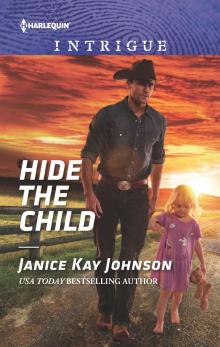 Hide the Child
Hide the Child Within Range
Within Range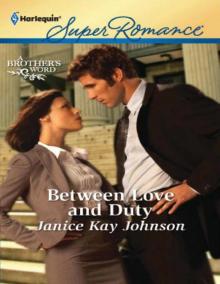 Between Love and Duty
Between Love and Duty First Comes Baby
First Comes Baby Charlotte's Homecoming
Charlotte's Homecoming In A Heartbeat (HQR Superromance)
In A Heartbeat (HQR Superromance)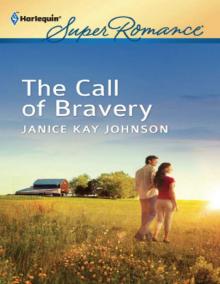 The Call of Bravery
The Call of Bravery In Hope's Shadow
In Hope's Shadow Anything for Her
Anything for Her Harlequin Superromance September 2014 - Bundle 1 of 2: This Good ManPromises Under the Peach TreeHusband by Choice
Harlequin Superromance September 2014 - Bundle 1 of 2: This Good ManPromises Under the Peach TreeHusband by Choice The Baby Agenda
The Baby Agenda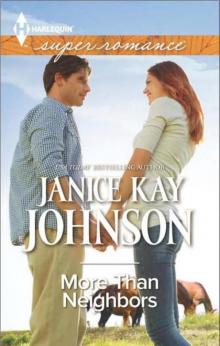 More Than Neighbors
More Than Neighbors Her Amish Protectors
Her Amish Protectors All That Remains
All That Remains Whisper of Revenge (A Cape Trouble Novel Book 4)
Whisper of Revenge (A Cape Trouble Novel Book 4) In a Heartbeat
In a Heartbeat A Mother's Claim
A Mother's Claim Because of a Girl
Because of a Girl Back Against the Wall
Back Against the Wall Dangerous Waters
Dangerous Waters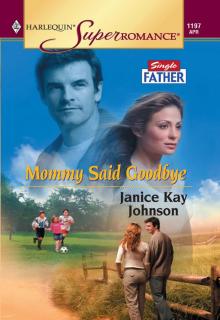 Mommy Said Goodbye
Mommy Said Goodbye A Mother's Secret
A Mother's Secret See How She Runs (A Cape Trouble Novel Book 2)
See How She Runs (A Cape Trouble Novel Book 2) Plain Refuge
Plain Refuge Bringing Maddie Home
Bringing Maddie Home For the Girls' Sake
For the Girls' Sake Through the Sheriff's Eyes
Through the Sheriff's Eyes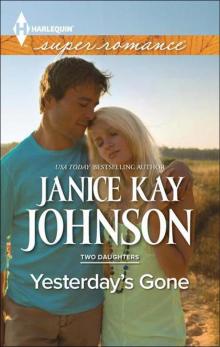 Yesterday's Gone (Two Daughters Book 1)
Yesterday's Gone (Two Daughters Book 1) All a Man Is
All a Man Is Harlequin Superromance January 2014 - Bundle 1 of 2: Everywhere She GoesA Promise for the BabyThat Summer at the Shore
Harlequin Superromance January 2014 - Bundle 1 of 2: Everywhere She GoesA Promise for the BabyThat Summer at the Shore No Matter What
No Matter What Wakefield College 01 - Where It May Lead
Wakefield College 01 - Where It May Lead Someone Like Her
Someone Like Her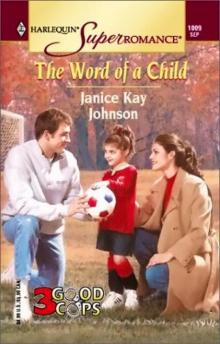 THE WORD OF A CHILD
THE WORD OF A CHILD Harlequin Superromance May 2016 Box Set
Harlequin Superromance May 2016 Box Set Open Secret
Open Secret The New Man
The New Man Finding Her Dad
Finding Her Dad The Perfect Mom
The Perfect Mom All Through The House
All Through The House Match Made in Court
Match Made in Court Making Her Way Home
Making Her Way Home From This Day On
From This Day On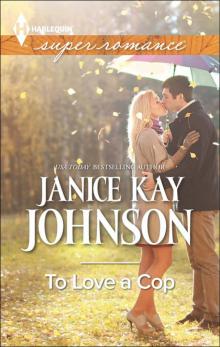 To Love a Cop
To Love a Cop The Hero's Redemption
The Hero's Redemption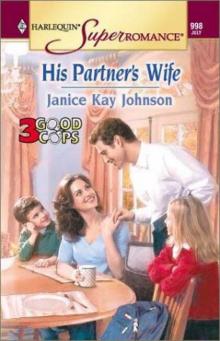 HIS PARTNER'S WIFE
HIS PARTNER'S WIFE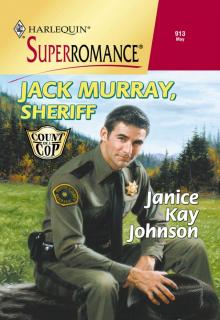 Jack Murray, Sheriff
Jack Murray, Sheriff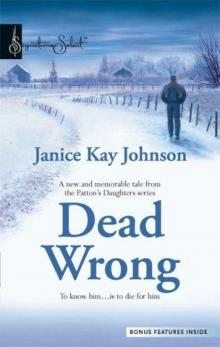 Dead Wrong
Dead Wrong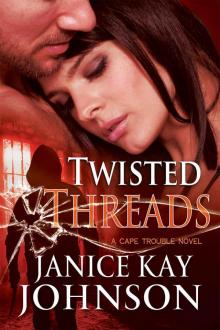 Twisted Threads (A Cape Trouble Novel Book 3)
Twisted Threads (A Cape Trouble Novel Book 3)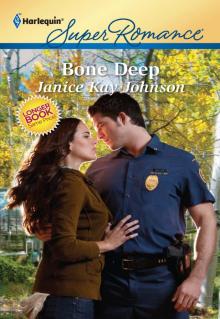 Bone Deep
Bone Deep The Closer He Gets
The Closer He Gets With Child
With Child Whose Baby?
Whose Baby? Kids by Christmas
Kids by Christmas